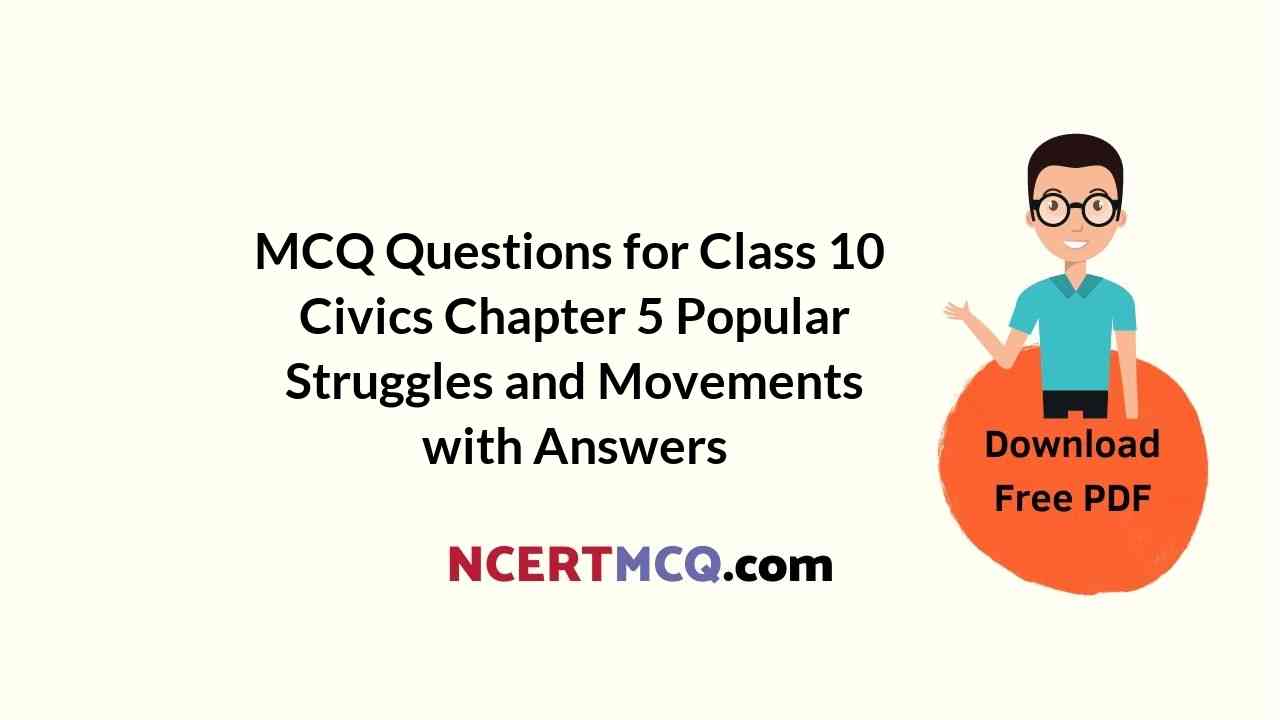Check the below NCERT MCQ Questions for Class 10 Civics Chapter 5 Popular Struggles and Movements with Answers Pdf free download. MCQ Questions for Class 10 Social Science with Answers were prepared based on the latest exam pattern. We have Provided Popular Struggles and Movements Class 10 Civics MCQs Questions with Answers to help students understand the concept very well. https://ncertmcq.com/mcq-questions-for-class-10-social-science-with-answers/
Class 10 Social Science Civics Chapter 5 MCQ With Answers
Civics Class 10 Chapter 5 MCQs On Popular Struggles and Movements
Choose the correct option:
Class 10 Civics Chapter 5 MCQ With Answers Question 1.
Which one of the following statements is correct regarding ‘sectional interest groups’?
(a) They promote collective rather than selective good.
(b) Their principal concern is betterment and well-being of their members, not society in general.
(c) They aim to help groups other than their own members.
(d) They do not seek to promote the interest of a particular section or group of society.
Answer
Answer: (b) Their principal concern is betterment and well-being of their members, not society in general.
Popular Struggles And Movements Class 10 MCQ Question 2.
What was the main reason of Bolivia’s Water War? Choose the most appropriate answer from the following:
(a) Privatisation of water supply
(b) Irregular water supply
(c) Supply of poor quality water
(d) An increase in water price by four times.
Answer
Answer: (d) An increase in water price by four times.
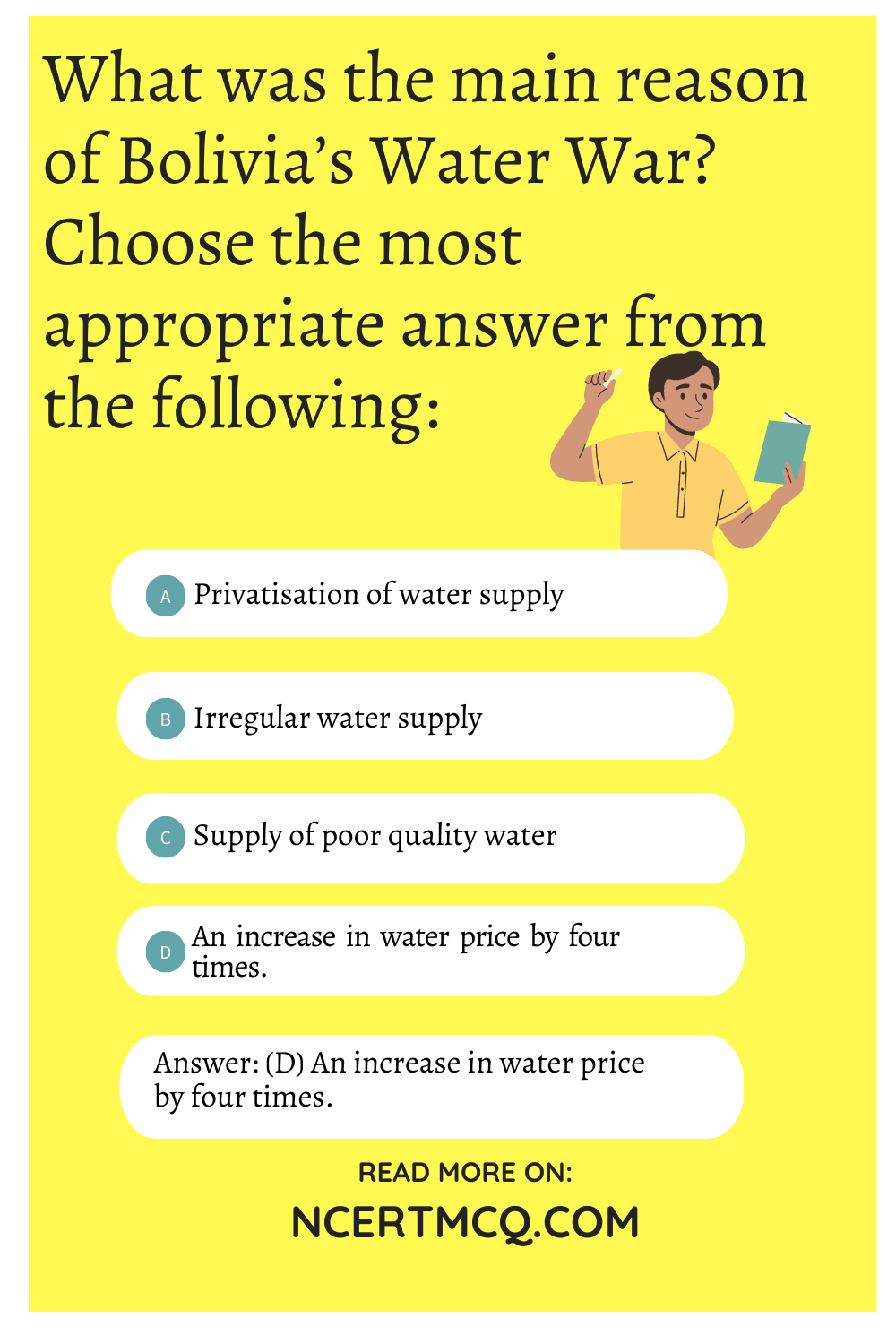
Social Movements Class 10 MCQ Question 3.
Which one of the following political parties came to power in Bolivia in 2006?
(a) The Communist Party
(b) The Republican Party
(c) The Socialist Party
(d) The Conservative Party
Answer
Answer: (c) The Socialist Party
MCQ On Popular Struggles And Movements Question 4.
Which one of the following was the main aim to start movement on April 2006, in Nepal?
(a) To control over government
(b) To snatch power from the king
(c) To restore democracy
(d) To dethrone the king
Answer
Answer: (c) To restore democracy
Social Movements Class 10 MCQ Questions Question 5.
Which of the following is not a movement?
(a) Narmada Bachao Andolan
(b) Women’s Movement
(c) Struggle in Nepal
(d) All India Trade Union Congress
Answer
Answer: (d) All India Trade Union Congress
Popular Struggles And Movements MCQ Question 6.
In 2006 the party that came to power in Bolivia was
(a) SPA —Seven Party Alliance
(b) Socialist Party
(c) Communist Party
(d) Nationalist Party
Answer
Answer: (b) Socialist Party
Question 7.
People’s struggle in Bolivia was
(a) to establish democracy
(b) about foundation of country’s politics
(c) against privatisation of water
(d) against privatisation of electricity
Answer
Answer: (c) against privatisation of water
Question 8.
Nepal witnessed an extraordinary popular movement in
(a) April 1990
(b) February 2005
(c) April 2006
(d) April 2004
Answer
Answer: (c) April 2006
Question 9.
Pressure groups and movements have deepened democracy by
(a) putting pressure on the public
(b) countering undue influence of the government
(c) non-accommodation of conflicting interests
(d) controlling and sharing political power
Answer
Answer: (b) countering undue influence of the government
Question 10.
In most cases the relationship between political parties and interest groups is
(a) direct
(b) not opposed to each other
(c) in dialogue and negotiation
(d) opposed yet in dialogue
Answer
Answer: (d) opposed yet in dialogue
Question 11.
Which of these is one of the agencies of organised politics?
(a) Political parties
(b) Pressure groups
(c) Movement groups
(d) All of the above
Answer
Answer: (d) All of the above
Explanation:
The spontaneous public participation becomes effective with the help of organised politics. There can be many agencies of organised politics. These include political parties, pressure groups and movement groups.
Question 12.
Which one of the following is not true about the pressure groups?
(a) They are directly engaged in party politics
(b) They take a political stance
(c) They organise protests
(d) They try to gain public support
Answer
Answer: (d) They try to gain public support
Explanation:
Pressure groups are organisations that attempt to influence government policies. But unlike political parties, pressure groups do not aim to directly control or share political power.
Question 13.
Who won Bolivia’s water war?
(a) People
(b) Government
(c) MNC
(d) None of the above
Answer
Answer: (a) People
Explanation:
People’s successful struggle against privatisation of water in Bolivia reminds us that popular struggles are integral to the working of democracy. The Bolivia’s water war is won by people.
Question 14.
Which financial agency/organisation pressurised the government to give up its control of municipal water supply?
(a) International Monetary Fund
(b) World Bank
(c) Central Bank of Bolivia
(d) None of these
Answer
Answer: (b) World Bank
Explanation:
Bolivia is a poor country in Latin America. The World Bank pressurised the government to give up its control of municipal water supply.
Question 15.
When did King Gyanendra dismiss the then prime minister and dissolve the Parliament?
(a) In February 2005
(b) In February 2006
(c) In March 2006
(d) In April 2006
Answer
Answer: (a) In February 2005
Explanation:
In February 2005, the king dismissed the then Prime Minister and dissolved the popularly elected Parliament.
Question 16.
Which of the following is a movement?
(a) Women’s movement
(b) Environmental movement
(c) Both a and b
(d) None of these
Answer
Answer: (c) Both a and b
Explanation:
People’s movement to describe many forms of collective action: Narmada Bachao Andolan, Movement for Right to Information, Anti-liquor Movement, Women’s Movement, Environmental Movement.
Question 17.
Which of the following is not a movement?
(a) Narmada Bachao Andolan
(b) Struggle in Nepal for democracy
(c) Women’s movement
(d) All India Trade Union Congress
Answer
Answer: (d) All India Trade Union Congress
Explanation:
People’s movement to describe many forms of collective action: Narmada Bachao Andolan, Movement for Right to Information, Anti-liquor Movement, Women’s Movement, Environmental Movement.
Question 18.
Which political party supported the protest in Bolivia, came to power in Bolivia in 2006?
(a) Socialist Party
(b) Communist Party
(c) Congress Party of Bolivia
(d) None of above
Answer
Answer: (a) Socialist Party
Explanation:
The movement was supported by the Socialist Party. In 2006, this party came to power in Bolivia.
Question 19.
Which of the following organisations/ institutions did not join the protest movement?
(a) Labour unions and their federations
(b) Organisation of indigenous people
(c) Organisation of teachers, lawyers and human rights groups
(d) Army
Answer
Answer: (d) Army
Explanation:
The struggle involved many organisations other than political parties. Many other organisations like the organisation of the indigenous people, teachers, lawyers and human rights groups extended support to the movement.
Question 20.
Which party spearheaded the mass upsurge in Nepal?
(a) Seven-Party Alliance (SPA)
(b) Nepalese Communist Party (Maoist)
(c) Nepalese Communist Party
(d) Nepalese Congress Party
Answer
Answer: (a) Seven-Party Alliance (SPA)
Explanation:
The call for indefinite strike was given by the SPA or the Seven Party Alliance in Nepal. This alliance included some big parties that had some members in the Parliament.
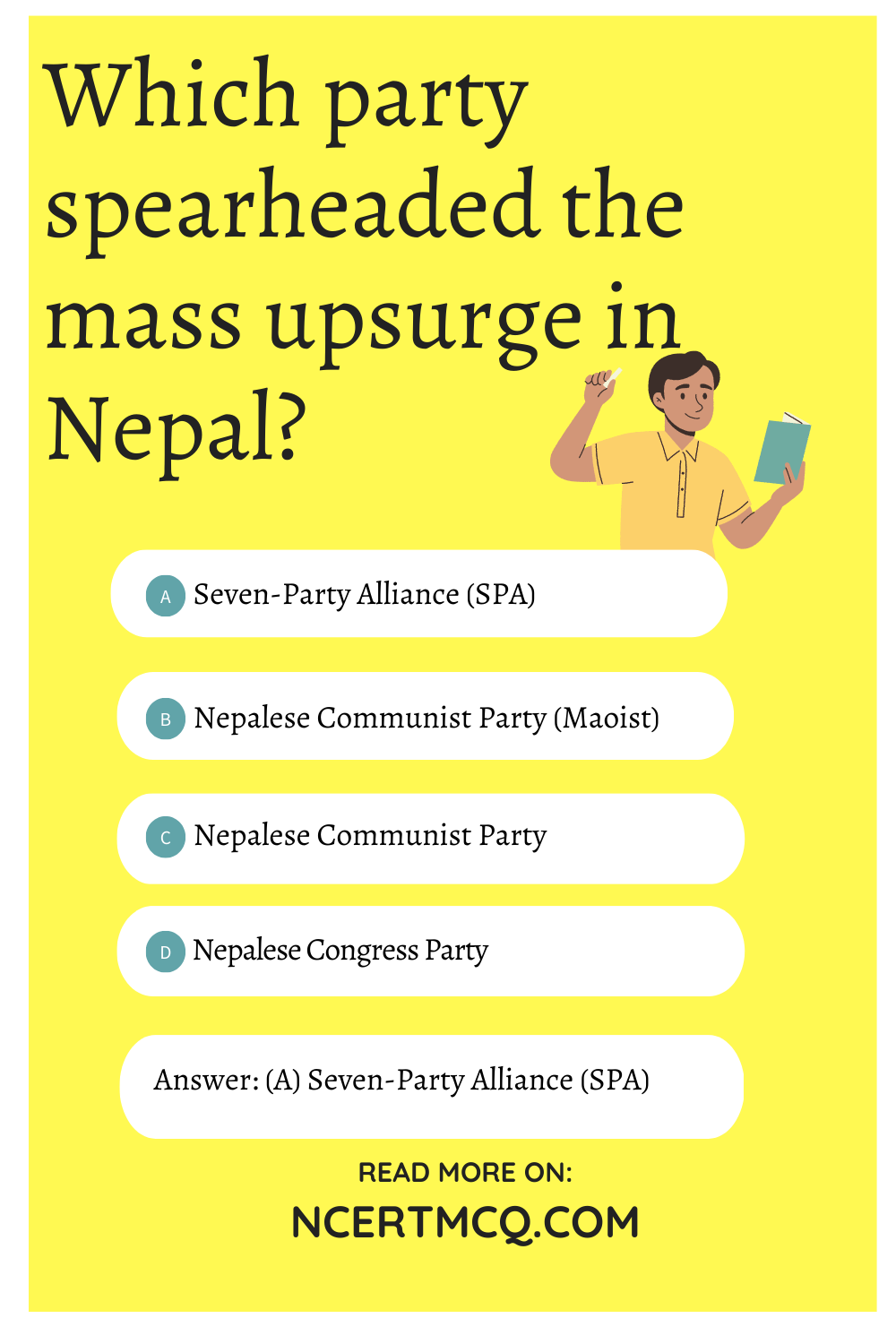
Picture-based Questions:
Question 1.
Look at the following cartoon takne from NCERT Textbook Page 62 and answer the question given below it.
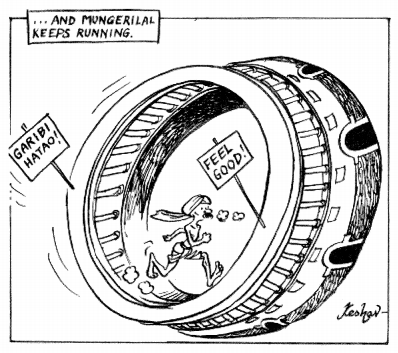
Governments initiate schemes and programmes to alleviate the suffering of the poor and meet their basic needs. But poverty remains in the country. What could be the reasons for such a situation?
Answer
Answer:
Governments, no doubt, initiate several schemes and programmes but these are not implemented in proper way. Neither do the benefits of these schemes and programmes reach to the poor for whom they were initiated. This is the bitter truth. That’s why poverty remains in the country. The middlemen play their role negatively and restrict all benefits for themselves. The system has become so corrupt that only governments and their schemes can’t do miracles. If we want to see a country sans poverty, each and every citizen needs to be transformed. Unless we are honest and dutiful we can’t remove poverty.
Question 2.
Study the given news clippings from NCERT Textbook Page 63 and answer the question that follows:
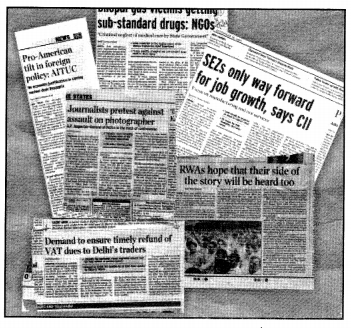
Can you identify the pressure groups functioning in the news clippings given here? What demand are they making?
Answer
Answer:
Yes, I can identify the pressure groups functioning in the above news clippings. These are- AITUC, NGOs, CII, Delhi’s traders and the association of journalists. AITUC are demanding pro-American tilt in foreign policy. The Association of journalists are protesting against assault on a photographer; the NGOs are drawing attention towards sub-standard medical treatment for the victims of Bhopal gas tragedy; CII opines that only SEZs can bring growth in employment opportunities; Delhi’s traders’ associations demand for timely refund of VAT dues.
We hope the given NCERT MCQ Questions for Class 10 Civics Chapter 5 Popular Struggles and Movements with Answers Pdf free download will help you. If you have any queries regarding Popular Struggles and Movements CBSE Class 10 Civics MCQs Multiple Choice Questions with Answers, drop a comment below and we will get back to you soon.
Class 10 Social Science Civics MCQ:
